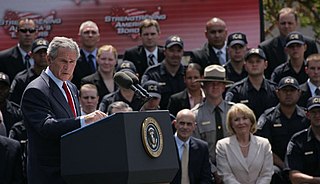
Discourse is a generalization of the notion of a conversation to any form of communication. Discourse is a major topic in social theory, with work spanning fields such as sociology, anthropology, continental philosophy, and discourse analysis. Following pioneering work by Michel Foucault, these fields view discourse as a system of thought, knowledge, or communication that constructs our experience of the world. Since control of discourse amounts to control of how the world is perceived, social theory often studies discourse as a window into power. Within theoretical linguistics, discourse is understood more narrowly as linguistic information exchange and was one of the major motivations for the framework of dynamic semantics, in which expressions' denotations are equated with their ability to update a discourse context.

Populism is a range of political stances that emphasize the idea of "the people" and often juxtapose this group with "the elite". It is frequently associated with anti-establishment and anti-political sentiment. The term developed in the late 19th century and has been applied to various politicians, parties and movements since that time, often as a pejorative. Within political science and other social sciences, several different definitions of populism have been employed, with some scholars proposing that the term be rejected altogether.
Critical discourse analysis (CDA) is an interdisciplinary approach to the study of discourse that views language as a form of social practice. CDA combines critique of discourse and explanation of how it figures within and contributes to the existing social reality, as a basis for action to change that existing reality in particular respects. Scholars working in the tradition of CDA generally argue that (non-linguistic) social practice and linguistic practice constitute one another and focus on investigating how societal power relations are established and reinforced through language use. In this sense, it differs from discourse analysis in that it highlights issues of power asymmetries, manipulation, exploitation, and structural inequities in domains such as education, media, and politics.

Ernesto Laclau was an Argentine political theorist and philosopher. He is often described as an 'inventor' of post-Marxist political theory. He is well known for his collaborations with his long-term partner, Chantal Mouffe.
Discursive psychology (DP) is a form of discourse analysis that focuses on psychological themes in talk, text, and images.
Ian Parker is a British psychologist and psychoanalyst. He is Emeritus Professor of Management in the School of Business at the University of Leicester.

Ruth Wodak is an Austrian linguist, who is Emeritus Distinguished Professor and Chair in Discourse Studies in the Department of Linguistics and English Language at Lancaster University and Professor in Linguistics at the University of Vienna.

Political communication is a subfield of communication and political science that is concerned with how information spreads and influences politics, policy makers, the news media, and citizens. Since the advent of the World Wide Web, the amount of data to analyze has exploded and researchers are shifting to computational methods to study the dynamics of political communication. In recent years, machine learning, natural language processing, and network analysis have become key tools in the subfield. It deals with the production, dissemination, procession and effects of information, both through mass media and interpersonally, within a political context. This includes the study of the media, the analysis of speeches by politicians, those that are trying to influence the political process, and the formal and informal conversations among members of the public, among other aspects. The media acts as a bridge between government and public. Political communication can be defined as the connection concerning politics and citizens and the interaction modes that connect these groups to each other. Whether the relationship is formed by the modes of persuasion, Pathos, Ethos or Logos.
Counter-jihad, also known as the counter-jihad movement, is a self-titled political current loosely consisting of authors, bloggers, think tanks, street movements and campaign organisations all linked by beliefs that view Islam not as a religion but as a worldview that constitutes an existential threat to Western civilization. Consequently, counter-jihadists consider all Muslims as a potential threat, especially when they are already living within Western boundaries. Western Muslims accordingly are portrayed as a "fifth column", collectively seeking to destabilize Western nations' identity and values for the benefit of an international Islamic movement intent on the establishment of a caliphate in Western countries. The counter-jihad movement has been variously described as anti-Islamic, Islamophobic, inciting hatred against Muslims, and far-right. Influential figures in the movement include the bloggers Pamela Geller and Robert Spencer.

Rosalind Clair Gill is a British sociologist and feminist cultural theorist. She is currently Professor of Social and Cultural Analysis at City, University of London. Gill is author or editor of ten books, and numerous articles and chapters, and her work has been translated into Chinese, German, Portuguese, Spanish and Turkish.
Post-Marxism is a perspective in critical social theory which radically reinterprets Marxism, countering its association with economism, historical determinism, anti-humanism, and class reductionism, whilst remaining committed to the construction of socialism. Most notably, post-Marxists are anti-essentialist, rejecting the primacy of class struggle, and instead focus on building radical democracy. Post-Marxism can be considered a synthesis of post-structuralist frameworks and neo-Marxist analysis, in response to the decline of the New Left after the protests of 1968.
Feminist post-structuralist discourse analysis (FPDA) is a method of discourse analysis based on Chris Weedon's theories of feminist post-structuralism, and developed as a method of analysis by Judith Baxter in 2003. FPDA is based on a combination of feminism and post-structuralism. While it is still evolving as a methodology, FPDA has been used by a range of international scholars of gender and language to analyse texts such as: classroom discourse, teenage girls' conversation, and media representations of gender. FPDA is an approach to analysing the discourse of spoken interaction principally.

Who are the Mind Benders?: The people who rule Britain through control of the mass media is a 1997 publication by Nick Griffin which was printed and distributed by the British National Party. The booklet outlines a Jewish conspiracy whereby Jews control the media in Britain and use this position to brainwash the [white] British population. Griffin claims for instance that Jews are responsible for “providing us with an endless diet of pro-multiracial, pro-homosexual, anti-British trash”.

Dutch withdrawal from the European Union refers to the hypothesis that the Netherlands might withdraw from the European Union. The most recent opinion poll on the subject, in January 2020, showed a 33% minority favouring withdrawal.

National memory is a form of collective memory defined by shared experiences and culture. It is an integral part to national identity.
Lilie Chouliaraki is a professor in Media and Communications at the London School of Economics and Political Sciences (LSE). Chouliaraki’s main area of research is the mediation of human vulnerability and suffering. She empirically explores how the media affects our moral and political relationships with distant others in the sense that it affects how we see the vulnerability of other people and how we are asked to feel, think and act toward them.
Techno-populism is either a populism in favor of technocracy or a populism concerning certain technology – usually information technology – or any populist ideology conversed using digital media. It can be employed by single politicians or whole political movements respectively. Neighboring terms used in a similar way are technocratic populism, technological populism and cyber-populism. Italy’s Five Star Movement and France’s La République En Marche! have been described as technopopulist political movements.
Bisexual theory is a field of critical theory, inspired by queer theory and bisexual politics, that foregrounds bisexuality as both a theoretical focus and as an epistemological lens. Bisexual theory emerged most prominently in the 1990s, in response to the burgeoning field of queer theory, and queer studies more broadly, frequently employing similar post-structuralist approaches but redressing queer theory's tendency towards bisexual erasure.

The anti-gender movement is an international movement that opposes what it refers to as "gender ideology", "gender theory" or "genderism", terms which cover a variety of issues and do not have a coherent definition. Members of the anti-gender movement primarily include those of the political right-wing and far right, such as right-wing populists, conservatives, and Christian fundamentalists. Anti-gender rhetoric has seen increasing circulation in trans-exclusionary radical feminist (TERF) discourse since 2016. Members of the anti-gender movement oppose some LGBT rights, some reproductive rights, government gender policies, gender equality, gender mainstreaming, and gender studies academic departments.
Hande Eslen-Ziya is a Turkish-born, Norway-based sociologist and psychologist. She is Professor of Sociology and Director of the Populism, Anti-Gender and Democracy Research Group at the University of Stavanger in Norway. She has an established interest in gender and social inequalities, transnational organizations and social activism, and has a substantial portfolio of research in this field. Her research has been published in Gender, Work and Organisation, Emotion, Space and Society, Social Movement Studies, European Journal of Women’s Studies, Culture, Health and Sexuality, Leadership, Men and Masculinities, and Social Politics, as well as in other internationally recognized journals. She is known for her work on the concept of "troll science," that she describes as an alternative discourse created by right-wing populist ideologies such as the anti-gender movement in opposition to established scholarly discourse.










